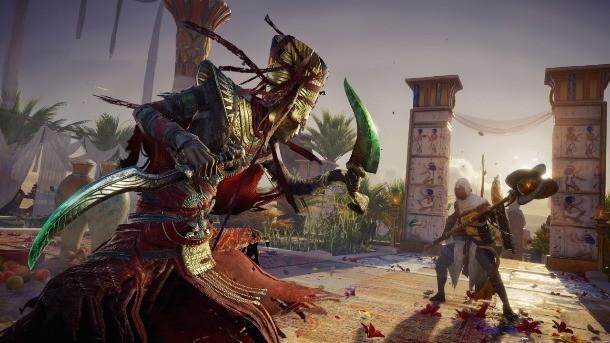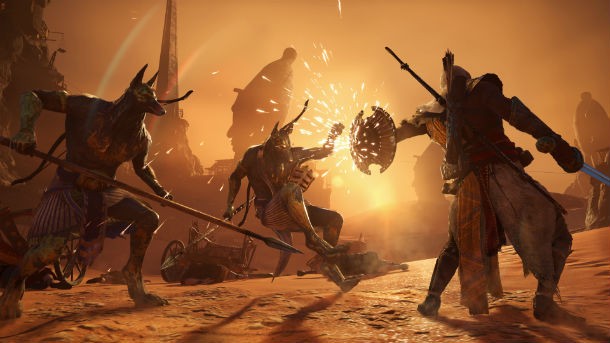Please support Game Informer. Print magazine subscriptions are less than $2 per issue
Should You Play Assassin’s Creed Origins: Curse Of The Pharaohs?

I’ve been extremely impressed with Ubisoft’s commitment to consistent new content drops for Assassin’s Creed Origins. After releasing a lengthy core game back in October, we’ve seen several smaller events, as well as a story expansion set in the Sinai Peninsula, and the surprisingly deep and rewarding Discovery Tour mode, which turned the game into an educational tool.
The third major expansion just released last week, and it takes us to Thebes, the Valley of the Kings, and the strange happenings of the Curse of the Pharaohs. Based on my playtime, it’s a heftier batch of gameplay than many might expect, with many hours of new zones to explore, quests to complete, and enemies to fight. If you’ve been following along with the game’s expansions up to this point and enjoying the ride, there’s plenty more of what you like to be found here. However, after so many dozens of hours of the Origins gameplay loop, Curse of the Pharaohs also feels like it might be the moment when fatigue and over-familiarity with core systems begin to take their toll.
Here’s what you can expect if you dive into the adventure.

A Land of Legend
Curse of the Pharaohs takes Bayek into Upper Egypt, where the ancient capital city of Thebes awaits discovery, alongside the many hidden tombs within the Valley of the Kings. The new areas are intriguing, setting themselves apart from the base game through a focus on ruins, mysticism and piety from the populace, and an overall mystique born of venerable age and secrecy.
I was also satisfied at the number of distinct zones to explore over the course of the expansion. This is a big playspace that features a lot of variety in landscapes, buildings, and monuments. Origins features one of the most intricate and thoughtfully imagined settings I’ve encountered in an open-world game, and it’s great to see more interesting sites within this reimagined world, from the sprawling Luxor Temple to new vistas overlooking the serpentine Nile.
In addition to all these real-world locations, players also visit physical manifestations of several Pharaohs’ afterlives. These bizarre self-contained landscapes are each distinct, but I don’t want to spoil too much about the sites you might encounter there, other than saying that they’re all beautiful and majestic. But each of them has its own appeal, and does the interesting task of telling you more about the pharaoh who resides there, since the environments reflect his or her personality and desires.

Accept The Fantasy
Until now, Assassin’s Creed Origins has flirted with fantastical elements in a way that could largely be reconciled with the rest of the franchise and its insistence on maintaining consistency and realism. Sure, the series has always had a fictional group of ancient beings that predate humanity, as well as the sci-fi conceit of the Animus, but the actual historical sections never saw your Assassin fighting dragons or casting spells. If Origins’ base game began to bend that rule with flaming swords and drug-fueled hallucinations of giant snakes, then Curse of the Pharaohs is the expansion that breaks the rule.
From beginning to end, Curse of the Pharaohs plays as a fantasy. But unlike, say, The Tyranny of King Washington from Assassin’s Creed III, this new expansion to Origins doesn’t hide behind a dream sequence or other mask. Rather, our hero Bayek is fighting undead mummies, traveling into physical manifestations of the afterlife, and engaging in magical rituals that shape the fate of dead souls. The experience can be jarring, especially if you have a long history with the franchise and its insistence on not veering into pure wizardry.
With that said, there’s no denying that these new magical elements add something new to the game. Fighting a giant scorpion is strange and amusing. And entering the afterlife of a long-dead pharaoh and seeing a ship sailing across a sea of open grassland is surreal and visually exciting.

A Lot To Do…For Better And Worse
As a rule, players cheer for game expansions that add a lot of new content, and Curse of the Pharaohs certainly fulfills that desire. There’s a lot to do, and a lengthy story to uncover. But that length may also be the expansion’s biggest problem.
Bayek can level from 45 to 55, which is satisfying and takes many hours of play. Those new levels fuel several new abilities in the power-up tree, but I can’t say that too many of them blew me away, with the exception of one especially powerful ability connected to overcharge use in combat. In short, it feels like we’ve already fully powered up Bayek in the original game, and at this point the new abilities don’t feel meaningful.
Likewise, despite the arrival of some new fantastical monsters to fight, the flow of gameplay in Curse of the Pharaohs is disappointingly similar to what we’ve already experienced for dozens of hours in the base game and its first expansion. Origins was already a lengthy game, and by the time I’d hit level cap, the combat had begun to grow stale, the fetch quests and become routine, and the fort infiltrations had become all too familiar. Those same problems are all the more apparent in an expansion that does little to change the core loop.
Origins is a really enjoyable game, but I’m not convinced that the depth of gameplay and the potential for upgrades matches the time investment that the game asks of its players. That problem is intensified in the lengthy adventure that makes up Curse of the Pharaohs, often leaving me feeling ho-hum about the action and missions, even as I continue to marvel at the beautiful setting.

Big Bosses, Small Returns
More than Bayek’s previous adventures in Egypt, Curse of the Pharaohs doubles down on the potential of big fights against powerful foes. Whether it’s the undead Shadows that rise up in the middle of city streets that must be fought off, or the actual boss fights against pharaohs like Nefertiti and Ramesses, expect to spend a good chunk of time fighting powerful, dangerous foes. These bosses look quite cool, often encased in sarcophagus-like suits of armor, and wielding legendary weapons that become yours when the fight concludes.
Unfortunately, like in the base Origins game, the boss fights simply aren’t any fun. The combat system doesn’t have the depth or complexity to support tight exchanges with powerful foes, and these undead pharaohs boast often absurdly high health bars that can take a long time to chip away at. Meanwhile, the attacks they inflict on you can often be one or two hit kills, which simply doesn’t encourage close and intense melee confrontations. Instead, I found myself constantly looking for cheap tricks to outwit a boss, like charging past repeatedly on horseback and then galloping away, or picking away at a foe with arrows until my overcharge meter was full and I could do a single devastating attack. The final boss fight, in particular, is a tedious slog that I just couldn’t enjoy.
That’s too bad, because the visual presentation and setup for these important fights is often thrilling. But without gameplay depth and precision to match the backdrop, I always came away unimpressed after these supposedly climactic confrontations.

Magical or Muddled?
Curse of the Pharaohs features a clear threat (a curse of reincarnated pharaohs) and a path to resolving that threat in the conclusion (assassinating the figure behind the curse). That’s good, because much of the space in between ends up a bit confusing.
Assassin’s Creed Origins has always excelled at bringing Ancient Egypt’s culture to life, particularly that society’s focus on religion, death, and the interaction between mortals and their gods. That dynamic is especially potent in this expansion, as nearly every conversation, main quest, and side quest seems to circle back to issues of life and death, the nature of divinity, or the pain of grief that separates us from those that have passed on.
These are heady concepts to tackle in an action game, and at times, Bayek’s interactions with the people he encounters are intriguing. But it’s easy to get lost in the constant allusions to gods, prophecy, and omens. At times, I found myself losing the thread of the story, simply because almost everything is couched in these otherworldly conceptions of religion and human existence.
Several new characters are introduced, but rather than really flesh them out in meaningful ways, the script often falls back on yet more conversations about belief, heretics, or ceremonies, and potentially compelling character concepts are left to flounder.
I love Origins authentic vision of mysticism and religion at the center of life for these people that might have lived thousands of years ago. But Curse of the Pharaohs makes the case that it’s possible to get a little carried away, losing touch with the narrative by getting lost in the game’s self-imposed mythology.
Strip away concerns about the story or gameplay repetition, and Curse of the Pharaohs is a large and worthy follow-up to the core game. If you were an enthusiastic player of the original game, hungry for new sites to explore, Curse of the Pharaohs has you covered. If, on the other hand, Origins felt like it had begun to wear out its welcome by the latter hours, I suspect Curse of the Pharaohs may not improve your opinion. While dressed in some increasingly fantastical garments, these myths are still very similar to the ones you already know.
Assassin’s Creed Origins: Curse of the Pharaohs is available now as part of the season pass, or separately for $19.99. Like the original game, you can pick up your copy on PS4, Xbox One, or PC.










